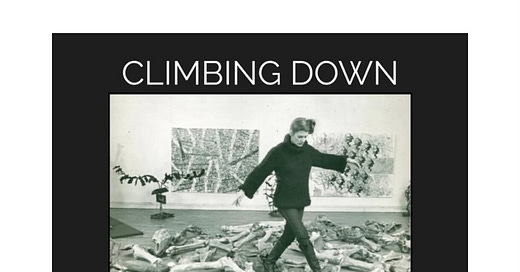A vital relationship with thinking, reading, and writing is possible. It’s not just for “thinkers” or scholars or artists or the wealthy. It should never be the exclusive property of the elite. And history has shown us (continues to show us) that most of what makes an institution exciting is taken from what happens outside its walls, on the fringes, with no funding, no connections, no nepo-anything, and then its vitality is captured, claimed, walled-off. It is part of my life’s work to resist this, while still (somehow!) making the things I want and need to make.
It’s no secret the humanities are in a bad way within the institutions—though you and I know that no subject is ever self-contained, and that cross-pollination among all pursuits (scientific, literary, political, etc.) is necessary and inevitable. And we know that systematic destruction of a society’s self-critical functions will harm everyone in the long run.
I’ve taught in different institutions, in different countries, in elementary schools and universities, community colleges and informal study groups, and what I see every single time is the thing that saved my life (I’m serious) when I first encountered philosophy and literature as a 17-year-old undergraduate: when we engage our need to ask difficult or impossible questions, we thrive.
When I first thought about doing these intensives, I wasn’t entirely sure I wanted to do them. Although teaching was my first professional pursuit—and something I’ll never leave behind—I now know that I am first and foremost a storyteller, a dreamer, a fool, and I know that I have to be careful about giving my intellect too much authority, if I’m to keep growing as an artist. And I definitely didn’t plan to start with Bataille. (Though who better, honestly, to keep me on my toes in this regard—to help me continually see the limits of intellect through intellect.) It’s just that I had spent over a decade with the questions his work poses—and all the interlinked worlds of art, science, history, psychology, economy, ecology—and I am always trying to outrun being typecast. But I kept getting emails and messages from people asking me where they should start with Bataille. Could I point them to a good secondary source? Could I recommend other theory, other books related to this question or that question? And those message just kept coming. So I thought: ok universe, I hear you.
For now, I’m keeping this small, I’m keeping it as accessible as possible, I’m keeping it relaxed but rigorous. A background in theory is not required, but I hope that some of my professional philosopher friends will join, if they’re drawn. If this first session fills up immediately, maybe I’ll add another for the month of May.
Ten thousand thank yous to those of you who have supported this idea and helped me work out the logistics. I might have lone wolf tendencies, but I have always known that I’m nothing without the people in my life.
The focus and the dates for the Lispector session will be determined in the coming months! Everything is in flux right now. As it should be.
Here is a link to register, if you’re interested.
As always,
Lindsay




